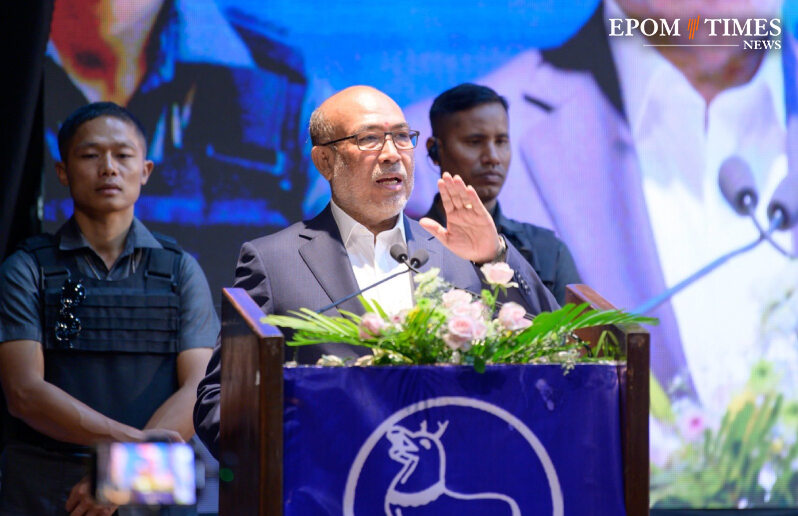In a resolute call for peace and progress, Manipur Chief Minister N. Biren Singh stressed the importance of political dialogue in resolving the state’s ongoing crisis, asserting that violence will only hinder solutions. His remarks were made during the inaugural session of a state-level workshop on the UNNATI (Uttar Poorva Transformative Industrialization Scheme) and RAMP (Raising and Accelerating MSME Performance) 2024, held at the City Convention Centre in Imphal on Thursday.
Addressing the audience, C.M. emphasized that constructive political dialogue remains the most effective way to address Manipur’s current unrest, which has roots in ethnic tensions, economic disparities, and political challenges. He underscored the futility of violence in achieving sustainable solutions, urging all stakeholders to commit to peaceful discourse.
The workshop, aimed at promoting industrialization and strengthening the MSME sector, served as a platform to discuss strategies for economic recovery and self-reliance in the state. Ministers, MLAs, senior officials, bankers, entrepreneurs, and experts attended the event, reflecting the government’s focus on collaborative efforts for development.
Despite disruptions caused by the COVID-19 pandemic and prolonged unrest, Manipur has made significant strides in development since 2017. The government’s initiatives in sectors such as agriculture, horticulture, industry, and MSMEs have laid the foundation for economic growth.
According to the Ministry of MSME’s 2018-19 annual report, Manipur emerged as a leader in MSME registrations among Northeastern states, with 12,438 businesses registered between 2015 and 2019. Impressively, 50% of these enterprises are owned by women, reflecting the state’s commitment to fostering inclusive growth. While Manipur accounts for just 0.2% of India’s population, it contributes 0.3% of the nation’s MSME sector, demonstrating its entrepreneurial vitality.
The Chief Minister expressed concern over the underutilization of funds allocated under the Manipur State Credit Guarantee Scheme. Of the ₹700 crore earmarked for the scheme, approximately ₹500 crore remains untapped. So far, ₹200 crore has been disbursed, benefitting 2,575 individuals. Chief Minister urged citizens to take advantage of the scheme to bolster local businesses and stimulate economic activity.
Highlighting the entrepreneurial spirit in the state, he noted that seven start-ups had successfully employed around 300 displaced individuals, showcasing the potential of innovation and entrepreneurship in addressing economic challenges.
To further drive economic revival, the government has established a dedicated cell within the planning department to prioritize agriculture and horticulture. He underscored the importance of these sectors in ensuring food security and reducing dependency on imports.
Manipur incurs significant expenses importing essential commodities, including eggs and fish. For instance, the state requires 200,000 eggs daily, costing over ₹10 lakh. To mitigate these costs, the government has sought assistance from the North Eastern Council (NEC) to procure modern machinery and enhance local production capabilities.
He called on banks to expedite the disbursal of sanctioned loans, emphasizing the need for prompt financial support to businesses and entrepreneurs. At the same time, he advised borrowers to ensure timely loan repayments, as this would maintain their creditworthiness and enable future borrowing opportunities.
The workshop featured detailed presentations by resource persons on the UNNATI and RAMP schemes, shedding light on their potential to transform Manipur’s industrial and economic landscape. The event drew participation from key stakeholders, including administrative secretaries, department heads, and members of the banking and entrepreneurial communities.
In conclusion, Chief Minister N. Biren Singh reiterated his government’s commitment to fostering peace and progress through dialogue, inclusivity, and economic empowerment. While challenges persist, Manipur’s focus on self-reliance, financial empowerment, and strategic sectoral growth reflects a clear vision for resilience and prosperity.
As the state navigates its current crisis, initiatives like the UNNATI and RAMP schemes offer a roadmap for sustainable development, underscoring the potential of collaboration and innovation in overcoming adversity.



